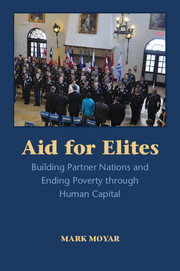Book contents
- Frontmatter
- Contents
- Preface
- Acknowledgments
- 1 Pathways to Development
- 2 How Governments Work
- 3 Civilization
- 4 Human Capital Development
- 5 Human Capital and National Security
- 6 Training
- 7 Militarization
- 8 Education in the Third World
- 9 Education in the United States
- 10 Support
- 11 Measurement
- 12 Conclusion: A New Foreign Assistance Strategy
- Notes
- Index
- Frontmatter
- Contents
- Preface
- Acknowledgments
- 1 Pathways to Development
- 2 How Governments Work
- 3 Civilization
- 4 Human Capital Development
- 5 Human Capital and National Security
- 6 Training
- 7 Militarization
- 8 Education in the Third World
- 9 Education in the United States
- 10 Support
- 11 Measurement
- 12 Conclusion: A New Foreign Assistance Strategy
- Notes
- Index
Summary
On September 11, 2001, four suicide airplane attacks ended a decade of optimism about global progress and showed that events in the third world had a more direct bearing on first world security and prosperity than ever before. Energized by the specter of international terrorism, the United States invaded Afghanistan and Iraq to nullify perceived threats to U.S. security and international peace. But the unexpected duration and costs of those wars, along with the passage of a dozen years with few terrorist-related casualties inside the United States, eroded American enthusiasm for large overseas commitments. American politicians began to slash defense spending and downsize America's military presence across the world while urging other nations to take on greater roles in international security.
In justifying American retrenchment, the administration of Barack Obama asserted that the attrition of Al Qaeda, the training of Afghanistan's security forces, and various other developments had made the world a safer place. Some tactical victories had indeed been scored in recent years. Yet the situation in the third world does not, in general, look much better today than it did on September 11, 2001, and is in some respects worse. Political upheaval, war, and the persistence of Islamic extremism have woven a belt of instability from Pakistan in the east through Afghanistan, Iran, Iraq, Syria, the Palestinian territories, Egypt, and Libya in the west. Pockets of danger lurk not far afield in Yemen, Somalia, Mali, and Nigeria. In these countries, the tremors of international terrorism, war, and humanitarian catastrophe continue to be felt with disturbing frequency and at times shake entire lands. Terrorist organizations also retain strength in Asia, especially in Indonesia, and the rogue regime in North Korea menaces the world with nuclear weapons, conventional military power, illicit financing, and cyberwarfare. In the Western hemisphere, the destabilization of Mexico and most of Central America by large narcotraffickers has caused large flows of illicit immigrants, drugs, and drug-related violence into the United States.
During the past five years, in various official and unofficial capacities, I have visited many of the countries buffeted by the tide of instability. During most of this travel, my primary purpose was to find ways for the United States to help these countries and, in the process, to protect its own interests.
- Type
- Chapter
- Information
- Aid for ElitesBuilding Partner Nations and Ending Poverty through Human Capital, pp. vii - xPublisher: Cambridge University PressPrint publication year: 2016



